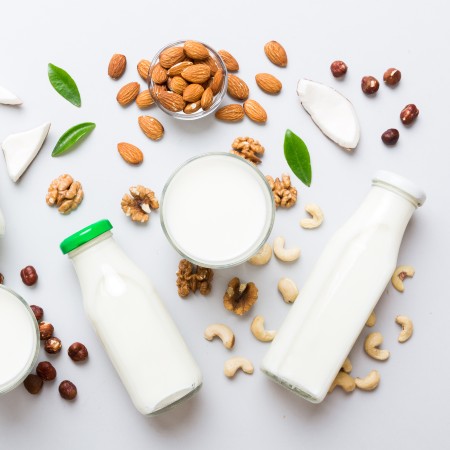A Nutrition Guide for Menopause
 What is the menopause?
What is the menopause?
Menopause is when menstruation stops permanently due to loss of ovarian activity. You are considered “menopausal or post-menopausal” when you have not had any periods or bleeding for one year. There are a number of menopausal stages, and the average age for people to enter the menopause is 51, however some may experience early menopause between 40–45 years old. Premature ovarian insufficiency can lead to an earlier menopause under the age of 40 and requires specialist intervention and tests1.
Read our full nutrition guide for menopause here. This guide provides vegan-friendly nutrition tips for people going through the menopause.
What happens during perimenopause and menopause?
Your body goes through various changes as you enter the menopause. Perimenopause is the period of transition from a normal ovulatory and menstrual cycle, to post-menopausal, when ovulation and menstruation stops2. The range and severity of symptoms differ between people and usually last around 4-7 years, but can last up to 12 years for some1. Symptoms of perimenopause and menopause are wide-ranging and can include the following1:
- Heavy and/or irregular periods
- Loss of fertility
- Reduced libido
- Vaginal dryness
- Urinary tract infections (UTIs)
- Incontinence
- Higher blood pressure
- Changes in blood cholesterol
- Hot flushes/night sweats
- Weight gain
- Muscle and joint pain
- Headaches
- Poor concentration
- Mood changes such as depression and anxiety
- Digestive issues3
Reduced oestrogen levels have a lasting effect on the body, including a higher risk of heart disease and osteoporosis. Osteoporosis is a condition that weakens bones and increases risk of fractures, and risk is increased during the menopause due to increased calcium losses from bones due to a loss of oestrogen4. Therefore, nutritional considerations to support heart health and bone health are still important during the menopause.
Many benefits associated with following plant-based diets are of particular relevance during the menopause, including managing symptoms and addressing the increased risk of heart disease and osteoporosis.

Heart health
Hormonal changes during and after the menopause increase the risk of cardiovascular disease. Following a well-planned plant-based diet can help to reduce this risk. 5,6,7
To help protect your heart you can replace saturated fats, like coconut, shea and palm fats, with unsaturated fats, such as peanuts, nuts, seeds, avocado and small amounts of vegetable oils and spreads. Fibre is also important for a heart healthy diet so make sure to include plenty of vegetables, fruits and wholegrains.
Body composition changes
During the menopause, hormonal changes can cause a reduction in muscle mass.8 As muscle mass is more metabolically active than other body tissues, you may need fewer calories than previously required to maintain your weight and it is common to gain fat mass during this time. Following a well-planned vegan diet based on healthy eating principles can help to manage this.
Increasing your protein intake from 1.0 to 1.2g per kilogram body weight per day (for example, a 60kg woman previously needing 60g of protein per day would now require 72g) can also help to reduce muscle loss, which is particularly effective when paired with resistance exercise.
Check out our nutrient web pages for more information on protein.


Bone health
Everyone experiences a steady reduction in bone density during later life. However, changes can happen more rapidly in the decade after menstrual periods stop due to the drop in oestrogen, which increases the risk of osteoporosis and fractures.2
It is particularly important to follow bone health guidance during the menopause, and to increase your calcium intake by including one additional portion of calcium-rich food daily.
Resistance exercise, a balanced diet and stopping smoking can help to keep your bones strong.
Check out our nutrient webpages for further information about how to get enough calcium and vitamin D.
Phytoestrogens
There is some evidence that consumption of phytoestrogens may relieve symptoms of the menopause because plant and human oestrogen structures are similar. Soya contains phytoestrogens and research suggests that consuming around two servings per day as part of a balanced diet may reduce severity and frequency of hot flushes during the menopause.9,10,11

